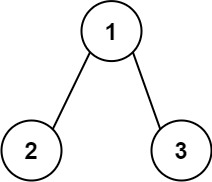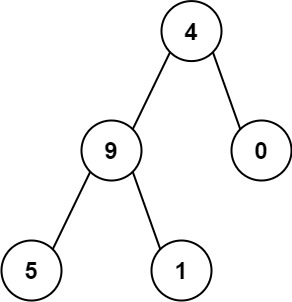source: https://leetcode.com/problems/sum-root-to-leaf-numbers/description/
Sum Root to Leaf Numbers
You are given the root of a binary tree containing digits from 0 to 9 only.
Each root-to-leaf path in the tree represents a number.
For example, the root-to-leaf path 1 -> 2 -> 3 represents the number 123.
Return the total sum of all root-to-leaf numbers. Test cases are generated so that the answer will fit in a 32-bit integer.
A leaf node is a node with no children.
Example 1:

Input: root = [1,2,3]
Output: 25
Explanation:
- The root-to-leaf path 1->2 represents the number 12.
- The root-to-leaf path 1->3 represents the number 13.
Therefore, sum = 12 + 13 = 25.
Example 2:

Input: root = [4,9,0,5,1]
Output: 1026
Explanation:
- The root-to-leaf path 4->9->5 represents the number 495.
- The root-to-leaf path 4->9->1 represents the number 491.
- The root-to-leaf path 4->0 represents the number 40.
Therefore, sum = 495 + 491 + 40 = 1026.
Constraints:
- The number of nodes in the tree is in the range [1, 1000].
- 0 <= Node.val <= 9
- The depth of the tree will not exceed 10.
|
1 2 3 4 5 6 7 8 9 10 11 12 13 14 15 16 17 18 19 20 21 22 23 24 25 26 27 28 29 30 |
/** * Definition for a binary tree node. * public class TreeNode { * int val; * TreeNode left; * TreeNode right; * TreeNode() {} * TreeNode(int val) { this.val = val; } * TreeNode(int val, TreeNode left, TreeNode right) { * this.val = val; * this.left = left; * this.right = right; * } * } */ class Solution { public int sumNumbers(TreeNode root) { return dfs(root, 0); } private int dfs(TreeNode node, int sum){ if(node == null) return 0; sum = sum*10+ node.val; if(node.left==null && node.right==null){ return sum; } return dfs(node.left, sum) + dfs(node.right, sum); } } |
n: total number of nodes in a tree
Time Complexity:
- O(n): since we need to visit each node in a Tree
Space complexity:
- O(1)